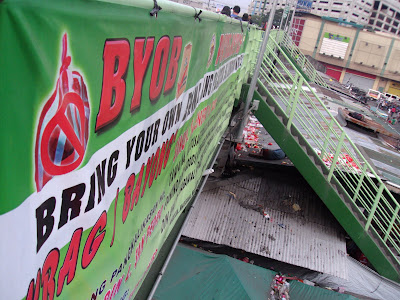EcoWaste Coalition calls for all-out support to Muntinlupa plastic ban to cut littering and flooding woes


 An environmental watchdog appealed to Muntinlupa City businesses and citizens to actively back the ban on plastic bags and other plastic disposables that will kick in next week.
An environmental watchdog appealed to Muntinlupa City businesses and citizens to actively back the ban on plastic bags and other plastic disposables that will kick in next week.City Ordinance 10-109 will take effect on January 18 after a year-long wait to give stakeholders, including consumers and commercial establishments, ample time to adjust and conform.
“The Muntinlupa plastic ban offers a beacon of hope for our beleaguered environment that has long been suffering from white pollution,” said veteran actor Roy Alvarez, President of the EcoWaste Coalition.
“White pollution pertains to the notorious litter caused by the unimpeded use and disposal of plastic materials such as polyethylene bags and polystyrene containers,” he explained.
Alvarez said the plastic ban is in accord with Muntinlupa’s mission “to carry out an efficient system for environmental protection and waste management” as he congratulated Mayor Aldrin San Pedro for refusing to budge to industry pressure to defer its implementation.
“By insisting to enforce the ban, Muntinlupa will become an environmental leader among local government units (LGUs) with this bold measure to reduce plastic litter and promote ecological values,” he emphasized.
City authorities through the Environmental Sanitation Center have put up posters, billboards and banners all over the city to inform and enjoin the general public to comply with the ban.
They have also complemented the ban with a “Bring Your Own Bag/Bayong (BYOB) campaign and supported the production of reusable bags made of cloth and indigenous materials as substitutes to plastic bags.
For her part, Sonia Mendoza of the EcoWaste Coalition’s Task Force on Plastics said that “the first citywide plastic ban in Metro Manila has the potential of triggering a domino effect among LGUs who are similarly struggling to find sustainable solutions to persistent garbage and flooding woes.”
“We should give all-out support to Muntinlupa’s effort to protect and nurture the environment,” added Mendoza whose group, the Mother Earth Foundation, represents the civil society in the Metro Manila Solid Waste Management Board.
Under the said ordinance, business establishments are prohibited from using, offering or selling plastic bags as primary or secondary packing materials for dry goods, as well as for wet goods such as fish, meat and poultry.
The ordinance further bans polystyrene containers, commonly known as “Styro,” for foodstuffs, drinks and other goods.
According to Section 15 of City Ordinance 10-109, violators shall be fined P500, P1,000 and P2,500 for the first, second and third offenses or imprisonment of not more than six months at the discretion of the court.
Business establishments found violating the law face the risk of having their licenses to operate cancelled for up to one year.
Mayor San Pedro had earlier said that “plastic bags and styrofoam materials are major contributors to the clogging of waterways in Metro Manila, which in turn cause flooding.”
Citing information from the city’s engineering department, San Pedro said that 90 percent of materials found obstructing storm drains and waterways are plastic discards, costing the city government P2.3 million for de-clogging operations in 2009.
The destructive Ondoy floods in 2009 prompted the city government to adopt further environmental measures such as the plastic ban that would keep Muntinlupa’s 11 rivers and three creeks that drain into the Laguna de Bay garbage free.
At the height of typhoon Ondoy, the lake overflowed, flooding the city’s barangays, which all sit along the lake except for one barangay, and causing the evacuation of over 3,500 families.
“Through this ordinance, we want to encourage business owners and the public to protect the environment by not using these materials,” the Mayor said.
-end-
For more information about the vision and mission of Muntinlupa City and City Ordinance 10-109, please visit:
http://www.muntinlupacity.gov.ph/v2/index.php





Comments